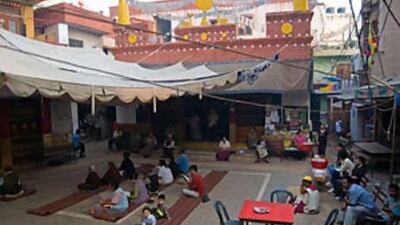NEW DELHI // After India's worst flood in half a century, the government sent an urgent appeal to the public for help. And, perhaps, the unlikeliest relief team sprung into action. Last month, the Tibetans of Majnu Ka Tila, a refugee camp on the edge of the capital, delivered 1,000 new saris for women and 750 dhotis for men - vital clothing for victims who have, literally, lost everything. The Tibetan Youth Congress, long a source for agitation and demonstrations against China, then scrambled into action, collecting more than two truckloads of clothing from Tibetan refugees across India. That mountain of clothing was loaded onto a train bound for troubled Bihar. In addition, Tibetans across India donated about 70,000 Indian rupees (Dh5,420) to the effort. When the Kosi River raged through its embankment high in the mountains of Nepal on Aug 18, the impoverished state was transformed almost overnight into a sea of chaos. Official reports place the death toll at more than 1,000 people, with many more still missing. Meanwhile, more than one million people were instantly rendered homeless. Months after the disaster, the relief effort remains tenuous. Hundreds of thousands of people are crowded into refugee camps, entire villages still submerged and the final death toll is unknown. Tibetans feel such a debt to India for welcoming them, and even providing utilities, schools and health care that even today, Indians are still frequently called "sponsors". "We feel that when our sponsors, the Indian people, are suffering, we are committed to help them, whatever little we can," said Urgyen Chophel, president of the New Delhi branch of the Tibetan Youth Congress. "We have been staying here for 49 years as refugees," said Tenzing Lungtok, the group's cultural secretary. "The Indian government has been taking good care of the Tibetan people, providing schools for Tibetan children and providing whatever help the Tibetan government-in-exile needs." "We Tibetans living in India should have a little bit of responsibility. When they are in need we try to do as much as we can. We have been collecting clothes from many settlements, not only Delhi." Indeed, volunteers fanned out to Tibetan settlements across the country. Today, about 3,500 Tibetans live in Majnu Ka Tila, the bulk of the 5,000 Tibetan refugees in the capital. Across the country, more than 100,000 Tibetans call India home, with their exiled government, under the Dalai Lama, based in the northern city of Dharamsala. Although relief from India's Tibetan refugees may represent only a trickle of what flood victims need, the gesture looms all the larger considering the source. "Tibetan people are not rich," Mr Chophel said. "There are families that cannot support themselves. They cannot look after their children or education." Tibetans here have a long history of looking after themselves - by necessity. The first wave of refugees arrived at Majnu Ka Tila in the mid-1950s, following an exodus from Chinese-controlled Tibet. About 80,000 refugees fled their homeland following their exiled leader, the Dalai Lama. "We had no freedom," said Tashi Tundup, an elderly man who counts himself among the early arrivals at the camp. So, he walked, mostly, for 15 days, from Lhasa to Kathmandu. Eventually, he arrived at Majnu Ka Tila, where he sells ceremonial daggers of brass and iron, heavy bracelets and trinkets. Mr Tundup earns just enough to support himself in a single room at the camp. In the early days, refugees sold hand-knit sweaters. But as a cold-weather business, it proved limited in New Delhi, where, even in winter, temperatures rarely reach the freezing point. Cue the vegetable markets and spice shops, and later, the travel agencies, computer stores and long-distance call centres. With the colony's transformation from tarps and tents to concrete homes and businesses, it has found a measure of stability. Several high-profile celebrities and politicians have since made Majnu Ka Tila a kind of pet project. During the 1970s, when she was prime minister, Indira Gandhi visited frequently to hand out clothing. And in the 1980s, her son and successor, Rajiv Gandhi, personally oversaw the installation of water pipes throughout the camp. But relations have become strained in recent years. Refugees, notably from the Tibetan Youth Congress, have clashed with authorities in the past - most recently when police arrested scores of protesters who refused to allow them to take hunger strikers to the hospital. In addition, the organisation has become vocal about what they perceive to be a soft diplomatic stance with China - which they accuse of occupying Tibet. In fact, the camp's own footing in India has grown increasingly uncertain in recent years. The government has ordered the camp dispersed because it is built, ironically, on the flood-prone banks of the Yamuna River. Camp residents are currently embroiled in a bitter court battle to fight the government eviction. And internally, the camp fights its own demons. "The younger generation, they don't study properly, they leave school early and then they indulge in smoking and become drug addicts," Mr Chophel said. Those who battle addictions are sent to rehab clinics, where their bills are paid by the government-in-exile in Dharamsala. "We also help these people," Mr Chophel said. "When they come back, they are sent back to their families. This is my business. Whosoever needs help, I look after them." But, as evidenced by the recent disaster in Bihar, those ministrations are not limited to the camp itself. Among these refugees, the drive to ease the suffering of a distant people in India's ravaged north-east remains ongoing. "All the Tibetan people who are living in India, we are collecting monetary contributions from all Tibetans." ccotroneo@thenational.ae

Tibetans in exile chip in flood relief
Refugees, feeling responsibility towards India for providing them with asylum for 49 years, give what they can afford for deluge victims.
Most popular today
5
